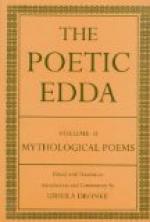So the bondmaids ground on in giant-wrath, while the sea-king Mysing sailed nearer with his host, until the quern-stones split; and then the daughters of the mountain-giants spoke once more: “We have ground to our pleasure, Frodi; we maids have stood long at the mill.”
A Norseman was rarely content to allow a fortunate ending to any hero, and a continuation of the story therefore makes the mill bring disaster on Mysing also. After slaying Frodi and burning his hall, he took the stones and the bondmaids on board his ship, and bade them grind salt. They ground till the weight sank the ship to the bottom of the sea, where the mill is grinding still. This is not in the song, though it has lived longer popularly than the earlier part. Dr. Rydberg identities Frodi with Frey, the God of fertility.
The Everlasting Battle.—No Eddic poem survives on the battle of the Hjathnings, the story of which is told in prose by Snorri. It must, however, be an ancient legend; and the hero Hedin belongs to one of the old Germanic heroic races, for the minstrel Deor is a dependent of the Heodenings in the Old English poem to which reference will be made later. The legend is that Hild, daughter of Hoegni, was carried away by Hedin the Hjathning, Hjarrandi’s son. Hoegni pursued, and overtook them near the Orkneys. Then Hild went to her father and offered atonement from Hedin, but said also that he was quite ready to fight, and Hoegni need expect no mercy. Hoegni answered shortly, and Hild returning told Hedin that her father would accept no atonement but bade him prepare to fight. Both kings landed on an island, followed by their men. Hedin called to Hoegni and offered atonement and much gold, but Hoegni said it was too late, his sword was already drawn. They fought till evening, and then returned to their ships; but Hild went on shore and woke up all the slain by sorcery, so that the battle began again next day just as before. Every day they fight, and every night the dead are recalled to life, and so it will go on till Ragnaroek.
In the German poem, Gudrun, the Continental version of this legend occurs in the story of the second Hilde. She is carried away by the minstrel Horant (who thus plays a more active part than the Norse Hjarrandi), as envoy from King Hettel, Hedin’s German counterpart. Her father Hagen pursues, and after a battle with Hettel agrees to a reconciliation. The story is duplicated in the abduction of Hilde’s daughter Gudrun, and the battle on the Wuelpensand.
Another reference may probably be supplied by the much debated lines 14-16 from the Anglo-Saxon Deor, of which the most satisfactory translation seems to be: “Many of us have heard of the harm of Hild; the Jute’s loves were unbounded, so that the care of love took from him sleep altogether.” Saxo, it is true, makes Hild’s father a Jute, instead of her lover, and Snorri apparently agrees with him in making Hedin Norwegian; but in the Gudrun Hettel is Frisian or Jutish. The Anglo-Saxon Widsith mentions in one line Hagena, king of the Holmrygas (a Norwegian province), and Heoden, king of the Glommas (not identified), who may be the Hoegni and Hedin of this tale.




